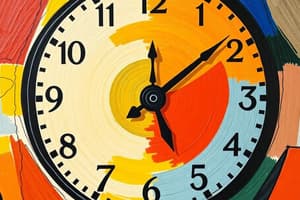Podcast
Questions and Answers
In French, how would you express 'It's quarter to' when referring to time?
In French, how would you express 'It's quarter to' when referring to time?
- et demie
- pile
- et quart
- moins le quart (correct)
If someone asks 'Quelle heure est-il?', what are they asking?
If someone asks 'Quelle heure est-il?', what are they asking?
- How are you?
- What time is it? (correct)
- What day is it?
- Where are we?
What is the most appropriate way to say 'It is 3:30 PM' in French using the 24-hour clock?
What is the most appropriate way to say 'It is 3:30 PM' in French using the 24-hour clock?
- Il est trois heures trente.
- Il est quinze heures et demie.
- Il est quinze heures trente. (correct)
- Il est trois heures et demie.
Which of the following is the correct translation of 'It's seven o'clock'?
Which of the following is the correct translation of 'It's seven o'clock'?
How would you accurately write 10:15 AM in French?
How would you accurately write 10:15 AM in French?
Which of these is the most grammatically correct way to express 8 PM in French, according to the 24-hour clock?
Which of these is the most grammatically correct way to express 8 PM in French, according to the 24-hour clock?
If someone says, 'Il est midi,' what time is it?
If someone says, 'Il est midi,' what time is it?
What is the correct translation of 'It's raining'?
What is the correct translation of 'It's raining'?
Which of the following sentences uses the correct structure to describe the weather?
Which of the following sentences uses the correct structure to describe the weather?
Which is an accurate translation of 'the summer'?
Which is an accurate translation of 'the summer'?
If you want to say 'In winter', what would you say?
If you want to say 'In winter', what would you say?
Select the correct way to express 'It's foggy' in French.
Select the correct way to express 'It's foggy' in French.
Translate: 'The eyes'
Translate: 'The eyes'
What is the French term for 'shoulder'?
What is the French term for 'shoulder'?
Which term refers to 'fingernail'?
Which term refers to 'fingernail'?
What is the correct translation for 'the youngest child'?
What is the correct translation for 'the youngest child'?
Which of these is the correct term for 'grandfather'?
Which of these is the correct term for 'grandfather'?
What does 'elles' refer to?
What does 'elles' refer to?
What does the word 'Nous' mean?
What does the word 'Nous' mean?
What are 'le, la, l', les'?
What are 'le, la, l', les'?
Flashcards
French time system
French time system
In French, time is based on the 24-hour clock.
Heure
Heure
It refers to o'clock.
Il est une heure
Il est une heure
It's one o'clock.
Il est une heure vingt
Il est une heure vingt
1:20 AM
Signup and view all the flashcards
Fractions of an hour
Fractions of an hour
Ways to say half past, quarter past, and quarter to.
Signup and view all the flashcards
et demie
et demie
30 minutes past.
Signup and view all the flashcards
et quart
et quart
15 minutes past.
Signup and view all the flashcards
moins le quart
moins le quart
15 minutes before
Signup and view all the flashcards
Quel temps fait-il?
Quel temps fait-il?
A general question about the weather.
Signup and view all the flashcards
Il fait beau
Il fait beau
Describes good weather.
Signup and view all the flashcards
Il fait nuageux
Il fait nuageux
Indicates cloudy weather.
Signup and view all the flashcards
Il fait orageux
Il fait orageux
Describes stormy weather.
Signup and view all the flashcards
Il pleut
Il pleut
It's raining.
Signup and view all the flashcards
Il neige
Il neige
It's snowing.
Signup and view all the flashcards
Il fait chaud
Il fait chaud
It's hot.
Signup and view all the flashcards
Il fait du vent
Il fait du vent
It's windy.
Signup and view all the flashcards
Il fait mauvais
Il fait mauvais
It's not nice out.
Signup and view all the flashcards
La tête
La tête
French word for forehead.
Signup and view all the flashcards
Les yeux
Les yeux
French translation for eyes
Signup and view all the flashcardsStudy Notes
Telling Time - L'Heure
- "Quelle heure est-il?" translates to "What time is it?"
- "Heure" is the French word for "o'clock".
- French timekeeping uses the 24-hour clock, whereas English predominantly uses the 12-hour clock.
- To state the time, the format is "il est" + (hours) heure (minutes).
- 1 AM is "il est une heure", abbreviated as 1h00.
- 1:20 AM is "il est une heure vingt", abbreviated as 1h20.
- 1 PM is "il est treize heures" which equals 13h00.
- 2 PM is "il est quatorze heures" which equals 14h00.
- Midnight (12 AM or 24:00) is Il est vingt-quatre heures/il est minuit
Describing Minutes
- Half past (30 minutes past) is "et demie."
- Quarter past (15 minutes past) is "et quart."
- Quarter to (15 minutes before) is "moins le quart."
- 7:30 AM is "Il est sept heures et demie."
- 10:15 AM is "Il est dix heures et quart."
- 6:45 AM is "Il est sept heures moins le quart."
- While some French speakers may differ, legally "et quart," "et demie," and "moins le quart" should only be used with numbers 1 to 12.
- For the 24-hour clock, use "quinze," "trente," and "quarante-cinq" to mark minutes.
Weather - Le Temps
- "Quel temps fait-il ?" translates to "What is the weather like?"
- "Il fait beau" translates to "It’s nice weather."
- "Il fait nuageux" translates to "It is cloudy."
- "Il fait orageux" translates to "It’s stormy."
- "Il pleut" translates to "It’s raining."
- "Il neige" translates to "It’s snowing."
- "Il fait chaud" translates to "It’s hot."
- "Il fait du vent" translates to "It’s windy."
- "Il fait mauvais" translates to "It’s not nice out."
- "Il fait froid" translates to "It’s cold."
- "Il y a du brouillard" translates to "It's foggy"
- "Il fait _____ degrés" is used to express temperature, translating to "It's _____ degrees."
- The idiom "Il pleut des cordes" translates to "It's raining ropes”
Days of the Week and Months
- The French week begins on Monday.
- Days of the week are not capitalized in French.
- The format for writing dates is: Day of the week / Number / Month (+ Year).
- "Le mardi 15 décembre (2025)" is an example date
- The months of the year:
- January - "Janvier"
- February - "Février"
- March - "Mars"
- April - "Avril"
- May - "Mai"
- June - "Juin"
- July - "Juillet"
- August - "Août"
- September - "Septembre"
- October - "Octobre"
- November - "Novembre"
- December - "Décembre"
- Seasons
- Summer - L'été
- Spring - Le printemps
- Fall - L'automne
- Winter - L'hiver
- Describing seasons:
- In Summer - En été
- In Spring - Au Printemps
- In Fall - En automne
- In Winter - En hiver
Parts of the Body - Le Corps
- Hair: les cheveux (m)
- Head: La tête
- Face: Le visage
- Eye: L’œil (m)
- Eyes: Les yeux
- Nose: Le nez
- Cheek: La joue
- Mouth: la bouche
- Tongue: La langue
- Chin: Le menton
- Eyebrows: Le sourcil
- Eyelashes: Le cil
- Pupil: La pupille
- Lip: La lèvre
- Tooth: La dent
- Ear: L’oreille (f)
- Neck: Le cou
- Throat: La gorge
- Chest: La poitrine
- Heart: Le cœur
- Stomach: L’estomac (m)
- Arm: Le bras
- Shoulder: L’épaule (f)
- Elbow: Le coude
- Wrist: Le poignet
- Hand: La main
- Finger: Le doigt
- Fingernail: L’ongle (m)
- Thumb: Le pouce
- Back: Le dos
- Leg: La jambe
- Knee: Le genou
- Ankle: La cheville
- Foot: Le pied
- Toe: L’orteil (m)
Family - La Famille
- "La famille" refers to family and also to relatives
- Father: père
- Mother: mère
- Brother: frère
- Sister: sœur
- Children: enfants
- Son: fils
- Daughter: fille
- Male spouse: époux
- Female spouse: épouse
- Uncle: oncle
- Aunt: tante
- Nephew: neveu
- Niece: niece
- Grandfather: grand-père
- Grandmother: grand-mère
- Grandson: petit-fils
- Granddaughter: petite-fille
- Great grandson: arrière-petit-fils
- Great granddaughter: arrière-petite-fille
- "Un aîné / une aînée" refers to an older sibling or first-born child.
- "Un cadet / une cadette" refers to a younger sibling or second-born child.
- "Le benjamin / la benjamine" is the youngest child in a family.
Articles and Pronouns
- Definite Articles:
- Masculine Singular: Le, l’
- Feminine Singular: La, l’
- Plural (Both Genders): les
- Indefinite Articles:
- Masculine Singular: un
- Feminine Singular: une
- Plural (Both Genders): des
- Je (or j’ + vowel or h) = I
- Vous = You (formal, singular)
- Tu = You (informal, singular)
- Il = He/It
- Elle = She/It
- Nous = We
- On = We
- Vous = You (plural, formal and informal)
- ils = they ( masculine, or mixed gender)
- elles = they (feminine)
Studying That Suits You
Use AI to generate personalized quizzes and flashcards to suit your learning preferences.




